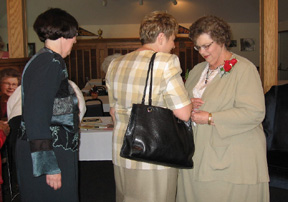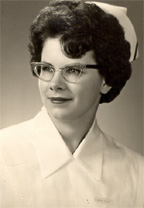 |
Judy Billings, Ph.D., far right, with guests. |
“I just always knew that’s what I was supposed to do,” Dr. Billings said. “My family, at times, tried to talk me out of it. My grandmother said to me ‘Oh, I just wish you’d do something where you could wear pretty clothes,’ with the idea that I would wear a uniform all the time and, of course, I haven’t worn a uniform for quite some time.”
On Friday (Sept. 30), Dr. Billings, assistant dean of the UNMC College of Nursing Kearney Division, will retire after 40 years in nursing. Steve Pitkin, assistant professor in the Kearney Division, will serve as interim assistant dean.
Born in Los Angeles, Dr. Billings was raised on a farm in north central Kansas. At 16, she started working in a hospital as an aide in Smith Center, Kan.
Since that time, she’s worked and/or gone to school five to seven days a week. “The only time I’ve ever taken off was for seven months when my daughter was born,” Dr. Billings said.
So, why is Dr. Billings so passionate about her work?
“I have a commitment to students,” Dr. Billings said. “Working with students allows you to extend yourself in dealing with patients and being able to improve patient care by teaching others to give good care. What’s rewarding to me is when you have a student who just really connects with a patient and the student says to you ‘I really get it now – I get that nursing is not just procedures. Nursing is working with these people and this family.’
“And I have a commitment to the school and want to see it succeed and grow. So I have an unwavering commitment to being sure that gets done and gets done well, probably to my own detriment sometimes.”
Dr. Billings graduated from Fort Hays (Kan.) State University, with a bachelor’s degree in nursing. When she graduated, she moved to the Kearney area where she worked for a few years at Good Samaritan Hospital.
 The idea of teaching was planted early in her career, she said.
The idea of teaching was planted early in her career, she said.
Although she didn’t pursue it, Dr. Billings was asked whether she would become a faculty member in Kansas. That started her thinking about going into education. As fate would have it, she was working on an American Heart Association committee with Janelle Jeltema, currently of Omaha, who was working at St. Francis Hospital in Grand Island in a nursing diploma program.
“I started asking her about schools — what it was like to work in a school of nursing,” Dr. Billings said. “And she said, ‘Are you interested in teaching?’ I said, ‘Well yeah, I’ve been thinking about it.’ So she said, ‘We’re going to have an opening this summer.’ ”
“I knew before I went there that that was exactly what I was supposed to do,” Dr. Billings said. “I never had a doubt.”
She worked at St. Francis from 1969 to 1972. Then, destiny intervened again.
She enrolled in a master’s program at the University of Minnesota, with a focus on medical/surgical nursing. It was there someone brought up the idea of going on for a doctorate. At the time, in 1974, she said there were only about two or three doctoral programs in nursing in the United States.
While working as an instructor at the South Dakota State University in Brookings, S.D., she finished her doctorate in educational administration at the University of Minnesota and worked in Brookings until 1976, when she accepted a position as department chairman for Kearney State College’s Department of Nursing.
“I had sent a letter to the president who was Brendan McDonald at the time, and asked if there was a teaching position available,” Dr. Billings said. “They had a grant to start the nursing program and they’d never been able to find anybody to carry out that grant. So David Clark, Ph.D., who was the dean of the School of Natural and Social Science at that time, contacted me and I came to interview and the rest is history, as they say.”
Dr. Clark said Dr. Billings has made a significant impact on nursing education and care in the state.
“Her impact was a very, very large one,” Dr. Clark said. “Because of her vision of what nursing service can be, the type of curriculum she developed, and the people she recruited, we’ve produced a tremendous cadre of nurses — a large percentage who at least have their first nursing experience in Nebraska.
“The goal initially was to serve central and western Nebraska with professional nurses. About 75 percent of graduates got their first employment in central and western Nebraska. This assured that hospitals, nursing homes and other facilities had access to highly qualified, professional nurses. The driving force for meeting that goal certainly was Judy Billings.”
When Dr. Clark thinks about Dr. Billings’ work as assistant dean for the Kearney Division, he thinks about the great vision she had about what nursing service should and could be for central and western Nebraska.
“She had the dedication to fill that vision,” he said. “When she came for the job interview, one thing I remember her saying is there was a great need for a nursing program to serve central and west Nebraska. She told me she thought she had the capability and vision to provide that service. It struck me as a very prophetic statement.”
Dr. Billings said starting a bachelor’s degree in nursing degree program in Kearney is the most important thing she’s done professionally, and, the most difficult. At the time, there weren’t any baccalaureate programs west of Omaha and Fremont.
“When we were starting the program, the Board of Nursing, the official approval body, was not used to baccalaureate education,” Dr. Billings said. “They really didn’t understand baccalaureate education, so getting the program approved through that process I think was really a major struggle.
“They assumed baccalaureate programs didn’t have that much clinical experience for the student and therefore the student wouldn’t be well qualified when they came out of the program. When we started the program, we had about the same amount of clinical experience as the diploma programs did just for that very reason. The college itself and the administrators of the college were very, very supportive and very helpful in doing that.”
Carol Wahl, chief nurse executive for the Good Samaritan Health Systems, said Dr. Billings has contributed much to nursing in Nebraska.
“When you reflect that Judy graduated 977 nurses during her tenure, it must be obvious how directly she influenced patient care at Good Samaritan Hospital,” Wahl said. “Our nursing recruitment and retention committee wanted to honor her for her many years of service and caring. We memorialized their thoughts on a plaque which said: Good Samaritan Hospital Nurses honor Dr. Judith Sims-Billings: “Leader Extraordinaire, Mentor, Visionary, Friend.”
While Dr. Billing’s love for nursing is apparent, it’s her love of the students that most impacts Wahl, she said. “She had an open door policy and always seemed to have her pulse on what was going on. She was supportive of our staff as preceptors and would provide feedback to them when awesome experiences occurred,” Wahl said.
“She is well-known to our staff — in fact she can hardly make it down a hallway without a group of them wanting to share something of themselves. She always facilitated positive relationships between education and service. Judy will be missed in her role of assistant dean — but we know she will continue to influence nursing in Nebraska through other ways.”